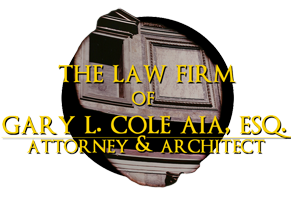Mediation and Arbitration Essentials for Architects, Engineers & Contractors
By Gary L. Cole AIA, Esq.
[Gary L. Cole AIA, Esq. is Chicago-based Illinois and Florida-licensed attorney and Illinois-licensed architect. He practices construction law, is a construction and commercial arbitrator and mediator, and is an historic preservation attorney and expert witness and consultant. He can be reached at www.garylcolelaw.com]
With civil litigation’s rising costs, mediation and arbitration are growing in popularity as potentially quicker and more cost-effective alternative dispute resolution forums. Architects, engineers and contractors who incorporate well-considered mediation and arbitration clauses into their contracts and service agreements may have an advantage over those who do not, and, who later find themselves embroiled in costly and protracted litigation.
Mediation and arbitration, however, differ fundamentally in their approaches and some conflicts may be better resolved in one forum over the other.
Mediation Basics
Broadly speaking, mediation is a more informal dispute resolution process than arbitration in which a neutral party – a mediator – assists two or more parties in reaching a negotiated settlement on their own.
Mediation is private, confidential and generally non-binding; unless a settlement agreement is entered into by the disputing parties. Many contracts, especially design and construction agreements, contain requirements that parties attempt to resolve any disputes through mediation as a prerequisite to pursing arbitration and/or litigation.
Mediation can occur through a process known as facilitative mediation, in which parties . . .
Read MoreUsing BIM in Construction Arbitration and Mediation?
By Gary L. Cole AIA, Esq.
Interesting article HERE, and I agree, BIM has unique possibilities in arbitration and mediation as an evidentiary tracking tool, but in different ways.
In construction arbitration, comparing a contractual scope of work — including one that evolved during a project — with the work completed might provide the parties and the arbitrator with a more objective and empirical measuring stick for comparing the parties’ intent with a project’s completion.
In construction mediation, especially in “evaluative” mediation, the same holds, but the BIM findings also provide the mediator with more tools to bring the dispute to settlement, mainly when those findings are used with the mediator’s summary of the strengths and weaknesses of each parties’ case, as presented to each party in confidential ex parte discussions.
However, in both arbitration and mediation, using a tool like BIM most effectively still requires that counsel for the parties, the arbitrator, and the mediator have the technical expertise to understand the kind of evidence BIM provides – and the ability to give that evidence the weight it does or does not deserve, depending on the dispute.
Read More